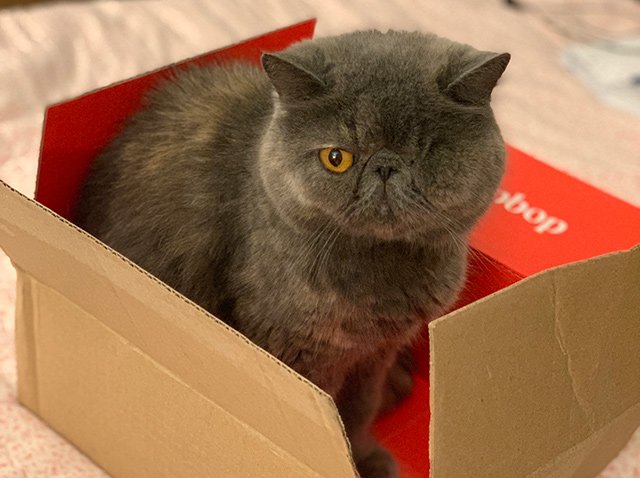New York Could Become First State To Ban Cat Declawing
June 5, 2019, 9:34 a.m.
It's believed 25% of cats in the U.S. are declawed.

Sadie the one-eyed cat is not declawed
The New York State Senate and Assembly passed legislation on Tuesday to ban cat declawing, which has long been criticized by animal advocacy groups. This would make New York the first state in the country to ban the practice, which is already outlawed in cities like Los Angeles, San Francisco, and Denver.
The procedure is described as an "amputation" by the American Veterinary Medical Association. "Declawing a cat is not like getting a mani/pedi, it's a brutal surgical procedure that involves removing the first bone of the cat's toe and part of the tendons and muscles," Assemblymember Linda Rosenthal (D-Manhattan) said in a statement. She has been pushing this legislation since 2015. Rosenthal added, "The days when this procedure is cavalierly offered for the convenience of the owners to protect couches and curtain are numbered."
It's finally happened, with the newly Democrat-led State Senate. Senate Deputy Leader Michael Gianaris (D-Queens) said, "Cat declawing is a brutal procedure similar to severing a human finger at the first knuckle and has lifelong ramifications for cats. I am proud of the Senate’s emphasis on animal welfare and I am pleased we passed this important proposal."
*meanwhile in the district*
Parker anxiously looks out on his W 72nd Street domain, biting his nails, awaiting passage of the #Declaw ban in the NYS Assembly! 🐾 🐾 pic.twitter.com/KRstFE8DH3— Linda B. Rosenthal (@LindaBRosenthal) June 4, 2019
Kitty is paw-sitively overjoyed that my bill to ban cat #declaw passed the Assembly and Senate! 😻 Cat #declaw is not like a mani/pedi💅; it’s a cruel, unnecessary amputation that results in the removal of most of the first bone, the tendons & muscles. Let’s end this NY! 🐾 pic.twitter.com/M9oVio3iRJ
— Linda B. Rosenthal (@LindaBRosenthal) June 4, 2019
Now the bill must be submitted to Governor Andrew Cuomo, who will have 10 days to sign it after it reaches his desk. Update: A spokesperson for the governor says the office will review the bill.
It is believed that 25% of cats in the U.S. are declawed.
The ASPCA, which is opposed to cat declawing for the sake of protecting furniture, explains, "Cats' claws are a vital part of their arsenal for both offense and defense. They use them to capture prey and to settle disputes with or escape from other animals or people who are hurting or threatening them. As part of their daily rituals, cats instinctually pull the claws on their front paws through surfaces that offer resistance. They do this to mark their territory, exercise muscles normally used in hunting, relieve stress and remove worn sheaths from their nails."
The Humane Society of the United States' position is that it is opposed "to declawing except for the rare cases when it is necessary for medical purposes, such as the removal of cancerous nail bed tumors," and also states, "People who are worried about being scratched, especially those with immunodeficiencies or bleeding disorders, may be told incorrectly that their health will be protected by declawing their cats. However, infectious disease specialists don't recommend declawing. The risk from scratches for these people is less than those from bites, cat litter, or fleas carried by their cats."
If passed, the law would fine people who declaw cats without a legitimate medical reason $1,000.
The New York Veterinary Medical Society opposed the bill, saying declawing should be left available as a last resort: "Medical decisions should be left to the sound discretion of fully trained, licensed and state supervised professionals." The American Veterinary Medical Association notes, "Scientific data do indicate that cats that have destructive scratching behavior are more likely to be euthanatized, or more readily relinquished, released, or abandoned, thereby contributing to the homeless cat population. Where scratching behavior is an issue as to whether or not a particular cat can remain as an acceptable household pet in a particular home, surgical onychectomy may be considered."
State Senator Robert Antonacci (R-Syracuse) said he opposes the bill: "I don’t think government should be involved. I think we should leave it to the vets and the owners." But fellow Republican State Senator James Tedisco (Adirondacks) supported the ban. According to the NY Times, Tedisco, who brought his Corgi to Albany, said, "Animals give us unconditional love. I think that this is the most nonpartisan day we have in the New York State Legislature.”
Gracie is ready for Animal Advocacy Day! pic.twitter.com/hfU8BKpuMl
— Senator Jim Tedisco (@JamesTedisco) June 4, 2019